- Home
- Jack London
Children of the Frost Page 4
Children of the Frost Read online
Page 4
"I have come back," Nam-Bok answered simply.
"Mayhap thou art a shadow, then, a passing shadow of the Nam-Bok that was. Shadows come back."
"I am hungry. Shadows do not eat."
But Opee-Kwan doubted, and brushed his hand across his brow in sore puzzlement. Nam-Bok was likewise puzzled, and as he looked up and down the line found no welcome in the eyes of the fisherfolk. The men and women whispered together. The children stole timidly back among their elders, and bristling dogs fawned up to him and sniffed suspiciously.
"I bore thee, Nam-Bok, and I gave thee suck when thou wast little," Bask-Wah-Wan whimpered, drawing closer; "and shadow though thou be, or no shadow, I will give thee to eat now."
Nam-Bok made to come to her, but a growl of fear and menace warned him back. He said something in a strange tongue which sounded like "Goddam," and added, "No shadow am I, but a man."
"Who may know concerning the things of mystery?" Opee-Kwan demanded, half of himself and half of his tribespeople. "We are, and in a breath we are not. If the man may become shadow, may not the shadow become man? Nam-Bok was, but is not. This we know, but we do not know if this be Nam-Bok or the shadow of Nam-Bok."
Nam-Bok cleared his throat and made answer. "In the old time long ago, thy father's father, Opee-Kwan, went away and came back on the heels of the years. Nor was a place by the fire denied him. It is said …" He paused significantly, and they hung on his utterance. "It is said," he repeated, driving his point home with deliberation, "that Sipsip, his klooch , bore him two sons after he came back."
"But he had no doings with the off-shore wind," Opee-Kwan retorted. "He went away into the heart of the land, and it is in the nature of things that a man may go on and on into the land."
"And likewise the sea. But that is neither here nor there. It is said … that thy father's father told strange tales of the things he saw."
"Ay, strange tales he told."
"I, too, have strange tales to tell," Nam-Bok stated insidiously. And, as they wavered, "And presents likewise."
He pulled from the bidarka a shawl, marvellous of texture and color, and flung it about his mother's shoulders. The women voiced a collective sigh of admiration, and old Bask-Wah-Wan ruffled the gay material and patted it and crooned in childish joy.
"He has tales to tell," Koogah muttered. "And presents," a woman seconded.
And Opee-Kwan knew that his people were eager, and further, he was aware himself of an itching curiosity concerning those untold tales. "The fishing has been good," he said judiciously, "and we have oil in plenty. So come, Nam-Bok, let us feast."
Two of the men hoisted the bidarka on their shoulders and carried it up to the fire. Nam-Bok walked by the side of Opee-Kwan, and the villagers followed after, save those of the women who lingered a moment to lay caressing fingers on the shawl.
There was little talk while the feast went on, though many and curious were the glances stolen at the son of Bask-Wah-Wan. This embarrassed him—not because he was modest of spirit, however, but for the fact that the stench of the seal-oil had robbed him of his appetite, and that he keenly desired to conceal his feelings on the subject.
"Eat; thou art hungry," Opee-Kwan commanded, and Nam-Bok shut both his eyes and shoved his fist into the big pot of putrid fish.
"La la, be not ashamed. The seal were many this year, and strong men are ever hungry." And Bask-Wah-Wan sopped a particularly offensive chunk of salmon into the oil and passed it fondly and dripping to her son.
In despair, when premonitory symptoms warned him that his stomach was not so strong as of old, he filled his pipe and struck up a smoke. The people fed on noisily and watched. Few of them could boast of intimate acquaintance with the precious weed, though now and again small quantities and abominable qualities were obtained in trade from the Eskimos to the northward. Koogah, sitting next to him, indicated that he was not averse to taking a draw, and between two mouthfuls, with the oil thick on his lips, sucked away at the amber stem. And thereupon Nam-Bok held his stomach with a shaky hand and declined the proffered return. Koogah could keep the pipe, he said, for he had intended so to honor him from the first. And the people licked their fingers and approved of his liberality.
Opee-Kwan rose to his feet "And now, O Nam-Bok, the feast is ended, and we would listen concerning the strange things you have seen."
The fisherfolk applauded with their hands, and gathering about them their work, prepared to listen. The men were busy fashioning spears and carving on ivory, while the women scraped the fat from the hides of the hair seal and made them pliable or sewed muclucs with threads of sinew. Nam-Bok's eyes roved over the scene, but there was not the charm about it that his recollection had warranted him to expect. During the years of his wandering he had looked forward to just this scene, and now that it had come he was disappointed. It was a bare and meagre life, he deemed, and not to be compared to the one to which he had become used. Still, he would open their eyes a bit, and his own eyes sparkled at the thought.
"Brothers," he began, with the smug complacency of a man about to relate the big things he has done, "it was late summer of many summers back, with much such weather as this promises to be, when I went away. You all remember the day, when the gulls flew low, and the wind blew strong from the land, and I could not hold my bidarka against it. I tied the covering of the bidarka about me so that no water could get in, and all of the night I fought with the storm. And in the morning there was no land,—only the sea,—and the off-shore wind held me close in its arms and bore me along. Three such nights whitened into dawn and showed me no land, and the off-shore wind would not let me go.
"And when the fourth day came, I was as a madman. I could not dip my paddle for want of food; and my head went round and round, what of the thirst that was upon me. But the sea was no longer angry, and the soft south wind was blowing, and as I looked about me I saw a sight that made me think I was indeed mad."
Nam-Bok paused to pick away a sliver of salmon lodged between his teeth, and the men and women, with idle hands and heads craned forward, waited.
"It was a canoe, a big canoe. If all the canoes I have ever seen were made into one canoe, it would not be so large."
There were exclamations of doubt, and Koogah, whose years were many, shook his head.
"If each bidarka were as a grain of sand," Nam-Bok defiantly continued, "and if there were as many bidarkas as there be grains of sand in this beach, still would they not make so big a canoe as this I saw on the morning of the fourth day. It was a very big canoe, and it was called a schooner . I saw this thing of wonder, this great schooner, coming after me, and on it I saw men—"
"Hold, O Nam-Bok!" Opee-Kwan broke in. "What manner of men were they?—big men?"
"Nay, mere men like you and me."
"Did the big canoe come fast?"
"Ay."
"The sides were tall, the men short." Opee-Kwan stated the premises with conviction. "And did these men dip with long paddles?"
Nam-Bok grinned. "There were no paddles," he said.
Mouths remained open, and a long silence dropped down. Opee-Kwan borrowed Koogah's pipe for a couple of contemplative sucks. One of the younger women giggled nervously and drew upon herself angry eyes.
"There were no paddles?" Opee-Kwan asked softly, returning the pipe.
"The south wind was behind," Nam-Bok explained.
"But the wind-drift is slow."
"The schooner had wings—thus." He sketched a diagram of masts and sails in the sand, and the men crowded around and studied it. The wind was blowing briskly, and for more graphic elucidation he seized the corners of his mother's shawl and spread them out till it bellied like a sail. Bask-Wah-Wan scolded and struggled, but was blown down the beach for a score of feet and left breathless and stranded in a heap of driftwood. The men uttered sage grunts of comprehension, but Koogah suddenly tossed back his hoary head.
"Ho! Ho!" he laughed. "A foolish thing, this big canoe! A most foolish thing! The plaything of the wind!
Wheresoever the wind goes, it goes too. No man who journeys therein may name the landing beach, for always he goes with the wind, and the wind goes everywhere, but no man knows where."
"It is so," Opee-Kwan supplemented gravely. "With the wind the going is easy, but against the wind a man striveth hard; and for that they had no paddles these men on the big canoe did not strive at all."
"Small need to strive," Nam-Bok cried angrily. "The schooner went likewise against the wind."
"And what said you made the sch—sch—schooner go?" Koogah asked, tripping craftily over the strange word.
"The wind," was the impatient response.
"Then the wind made the sch—sch—schooner go against the wind." Old Koogah dropped an open leer to Opee-Kwan, and, the laughter growing around him, continued: "The wind blows from the south and blows the schooner south. The wind blows against the wind. The wind blows one way and the other at the same time. It is very simple. We understand, Nam-Bok. We clearly understand."
"Thou art a fool!"
"Truth falls from thy lips," Koogah answered meekly. "I was over-long in understanding, and the thing was simple."
But Nam-Bok's face was dark, and he said rapid words which they had never heard before. Bone-scratching and skin-scraping were resumed, but he shut his lips tightly on the tongue that could not be believed.
"This sch—sch—schooner," Koogah imperturbably asked; "it was made of a big tree?"
"It was made of many trees," Nam-Bok snapped shortly. "It was very big."
He lapsed into sullen silence again, and Opee-Kwan nudged Koogah, who shook his head with slow amazement and murmured, "It is very strange."
Nam-bok took the bait. "That is nothing," he said airily; "you should see the steamer . As the grain of sand is to the bidarka, as the bidarka is to the schooner, so the schooner is to the steamer. Further, the steamer is made of iron. It is all iron."
"Nay, nay, Nam-Bok," cried the head man; "how can that be? Always iron goes to the bottom. For behold, I received an iron knife in trade from the head man of the next village, and yesterday the iron knife slipped from my fingers and went down, down, into the sea. To all things there be law. Never was there one thing outside the law. This we know. And, moreover, we know that things of a kind have the one law, and that all iron has the one law. So unsay thy words, Nam-Bok, that we may yet honor thee."
"It is so," Nam-Bok persisted. "The steamer is all iron and does not sink."
"Nay, nay; this cannot be."
"With my own eyes I saw it."
"It is not in the nature of things."
"But tell me, Nam-Bok," Koogah interrupted, for fear the tale would go no farther, "tell me the manner of these men in finding their way across the sea when there is no land by which to steer."
"The sun points out the path."
"But how?"
"At midday the head man of the schooner takes a thing through which his eye looks at the sun, and then he makes the sun climb down out of the sky to the edge of the earth."
"Now this be evil medicine!" cried Opee-Kwan, aghast at the sacrilege. The men held up their hands in horror, and the women moaned. "This be evil medicine. It is not good to misdirect the great sun which drives away the night and gives us the seal, the salmon, and warm weather."
"What if it be evil medicine?" Nam-Bok demanded truculently. "I, too, have looked through the thing at the sun and made the sun climb down out of the sky."
Those who were nearest drew away from him hurriedly, and a woman covered the face of a child at her breast so that his eye might not fall upon it.
"But on the morning of the fourth day, O Nam-Bok," Koogah suggested; "on the morning of the fourth day when the sch—sch—schooner came after thee?"
"I had little strength left in me and could not run away. So I was taken on board and water was poured down my throat and good food given me. Twice, my brothers, you have seen a white man. These men were all white and as many as have I fingers and toes. And when I saw they were full of kindness, I took heart, and I resolved to bring away with me report of all that I saw. And they taught me the work they did, and gave me good food and a place to sleep.
"And day after day we went over the sea, and each day the head man drew the sun down out of the sky and made it tell where we were. And when the waves were kind, we hunted the fur seal and I marvelled much, for always did they fling the meat and the fat away and save only the skin."
Opee-Kwan's mouth was twitching violently, and he was about to make denunciation of such waste when Koogah kicked him to be still.
"After a weary time, when the sun was gone and the bite of the frost come into the air, the head man pointed the nose of the schooner south. South and east we travelled for days upon days, with never the land in sight, and we were near to the village from which hailed the men—"
"How did they know they were near?" Opee-Kwan, unable to contain himself longer, demanded. "There was no land to see."
Nam-Bok glowered on him wrathfully. "Did I not say the head man brought the sun down out of the sky?"
Koogah interposed, and Nam-Bok went on.
"As I say, when we were near to that village a great storm blew up, and in the night we were helpless and knew not where we were—"
"Thou hast just said the head man knew—"
"Oh, peace, Opee-Kwan! Thou art a fool and cannot understand. As I say, we were helpless in the night, when I heard, above the roar of the storm, the sound of the sea on the beach. And next we struck with a mighty crash and I was in the water, swimming. It was a rock-bound coast, with one patch of beach in many miles, and the law was that I should dig my hands into the sand and draw myself clear of the surf. The other men must have pounded against the rocks, for none of them came ashore but the head man, and him I knew only by the ring on his finger.
"When day came, there being nothing of the schooner, I turned my face to the land and journeyed into it that I might get food and look upon the faces of the people. And when I came to a house I was taken in and given to eat, for I had learned their speech, and the white men are ever kindly. And it was a house bigger than all the houses built by us and our fathers before us."
"It was a mighty house," Koogah said, masking his unbelief with wonder.
"And many trees went into the making of such a house," Opee-Kwan added, taking the cue.
"That is nothing." Nam-Bok shrugged his shoulders in belittling fashion. "As our houses are to that house, so that house was to the houses I was yet to see."
"And they are not big men?"
"Nay; mere men like you and me," Nam-Bok answered. "I had cut a stick that I might walk in comfort, and remembering that I was to bring report to you, my brothers, I cut a notch in the stick for each person who lived in that house. And I stayed there many days, and worked, for which they gave me money —a thing of which you know nothing, but which is very good.
"And one day I departed from that place to go farther into the land. And as I walked I met many people, and I cut smaller notches in the stick, that there might be room for all. Then I came upon a strange thing. On the ground before me was a bar of iron, as big in thickness as my arm, and a long step away was another bar of iron—"
"Then wert thou a rich man," Opee-Kwan asserted; "for iron be worth more than anything else in the world. It would have made many knives."
"Nay, it was not mine."
"It was a find, and a find be lawful."
"Not so; the white men had placed it there And further, these bars were so long that no man could carry them away—so long that as far as I could see there was no end to them."
"Nam-Bok, that is very much iron," Opee-Kwan cautioned.
"Ay, it was hard to believe with my own eyes upon it; but I could not gainsay my eyes. And as I looked I heard…." He turned abruptly upon the head man. "Opee-Kwan, thou hast heard the sea-lion bellow in his anger. Make it plain in thy mind of as many sea-lions as there be waves to the sea, and make it plain that all these sea-lions be made into one sea-li
on, and as that one sea-lion would bellow so bellowed the thing I heard."
The fisherfolk cried aloud in astonishment, and Opee-Kwan's jaw lowered and remained lowered.
"And in the distance I saw a monster like unto a thousand whales. It was one-eyed, and vomited smoke, and it snorted with exceeding loudness. I was afraid and ran with shaking legs along the path between the bars. But it came with the speed of the wind, this monster, and I leaped the iron bars with its breath hot on my face…."
Opee-Kwan gained control of his jaw again. "And—and then, O Nam-Bok?"
"Then it came by on the bars, and harmed me not; and when my legs could hold me up again it was gone from sight. And it is a very common thing in that country. Even the women and children are not afraid. Men make them to do work, these monsters."
"As we make our dogs do work?" Koogah asked, with sceptic twinkle in his eye.
"Ay, as we make our dogs do work."
"And how do they breed these—these things?" Opee-Kwan questioned.
"They breed not at all. Men fashion them cunningly of iron, and feed them with stone, and give them water to drink. The stone becomes fire, and the water becomes steam, and the steam of the water is the breath of their nostrils, and—"
"There, there, O Nam-Bok," Opee-Kwan interrupted. "Tell us of other wonders. We grow tired of this which we may not understand."
"You do not understand?" Nam-Bok asked despairingly.
"Nay, we do not understand," the men and women wailed back. "We cannot understand."
Nam-Bok thought of a combined harvester, and of the machines wherein visions of living men were to be seen, and of the machines from which came the voices of men, and he knew his people could never understand.
"Dare I say I rode this iron monster through the land?" he asked bitterly.
Opee-Kwan threw up his hands, palms outward, in open incredulity. "Say on; say anything. We listen."
"Then did I ride the iron monster, for which I gave money—"
"Thou saidst it was fed with stone."
"And likewise, thou fool, I said money was a thing of which you know nothing. As I say, I rode the monster through the land, and through many villages, until I came to a big village on a salt arm of the sea. And the houses shoved their roofs among the stars in the sky, and the clouds drifted by them, and everywhere was much smoke. And the roar of that village was like the roar of the sea in storm, and the people were so many that I flung away my stick and no longer remembered the notches upon it."

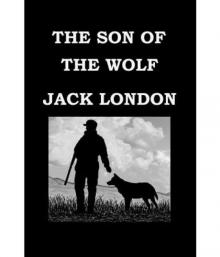 The Son of the Wolf
The Son of the Wolf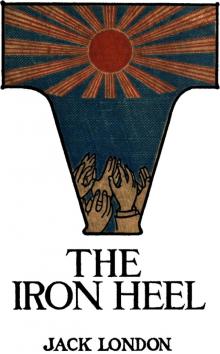 The Iron Heel
The Iron Heel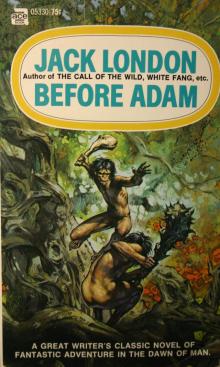 Before Adam
Before Adam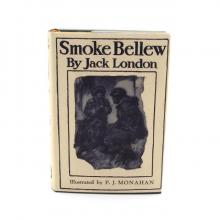 Smoke Bellew
Smoke Bellew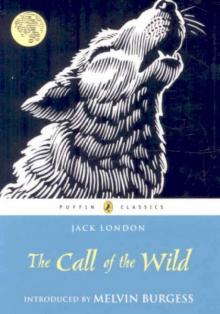 The Call of the Wild
The Call of the Wild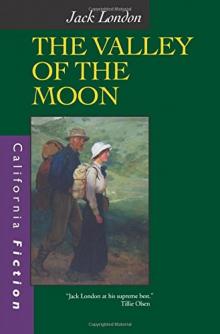 The Valley of the Moon Jack London
The Valley of the Moon Jack London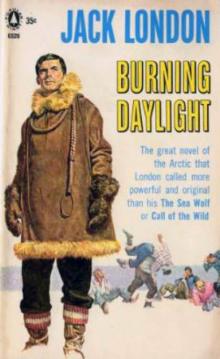 Burning Daylight
Burning Daylight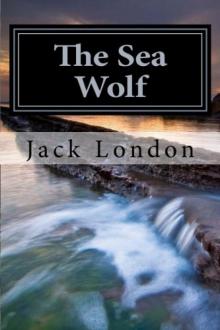 The Sea Wolf
The Sea Wolf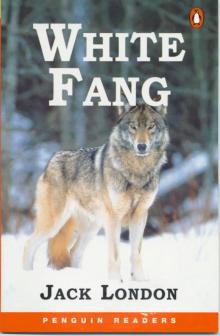 White Fang
White Fang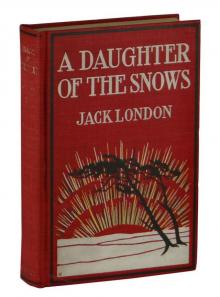 A Daughter of the Snows
A Daughter of the Snows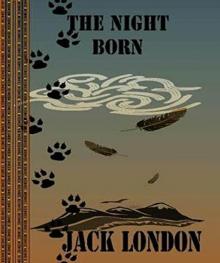 The Night-Born
The Night-Born A Son Of The Sun
A Son Of The Sun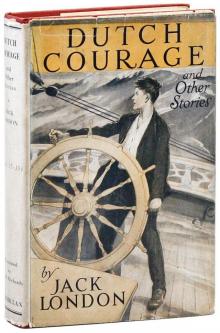 Dutch Courage and Other Stories
Dutch Courage and Other Stories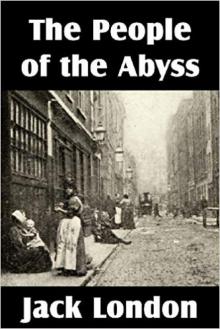 The People of the Abyss
The People of the Abyss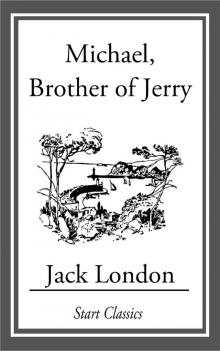 Michael, Brother of Jerry
Michael, Brother of Jerry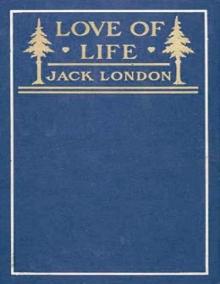 Love of Life, and Other Stories
Love of Life, and Other Stories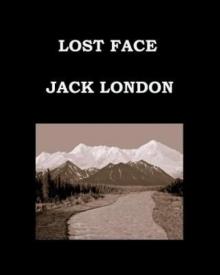 Lost Face
Lost Face The Road
The Road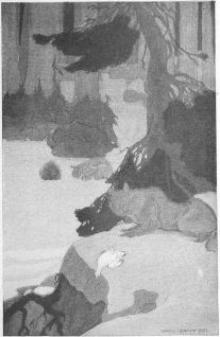 Love of Life
Love of Life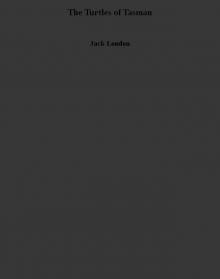 The Turtles of Tasman
The Turtles of Tasman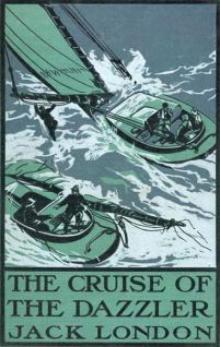 The Cruise of The Dazzler
The Cruise of The Dazzler The Heathen
The Heathen The Scab
The Scab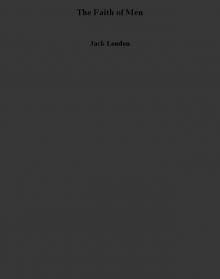 The Faith of Men
The Faith of Men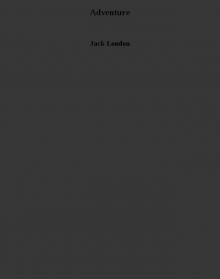 Adventure
Adventure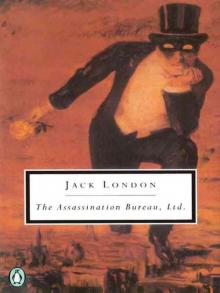 The Assassination Bureau, Ltd.
The Assassination Bureau, Ltd.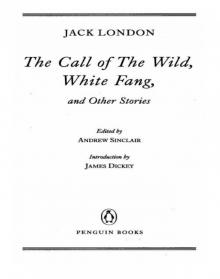 The Call of the Wild, White Fang, and Other Stories
The Call of the Wild, White Fang, and Other Stories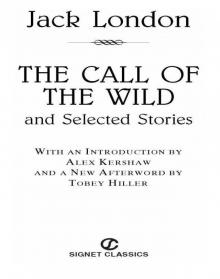 The Call of the Wild and Selected Stories
The Call of the Wild and Selected Stories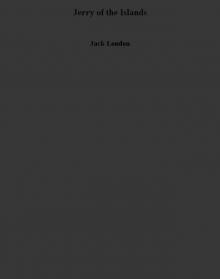 Jerry of the Islands
Jerry of the Islands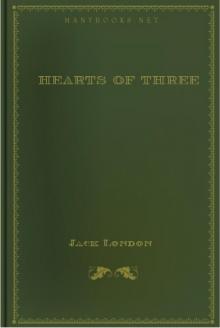 Hearts of Three
Hearts of Three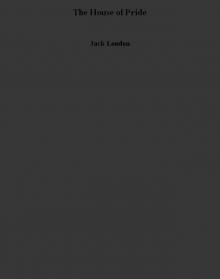 The House of Pride
The House of Pride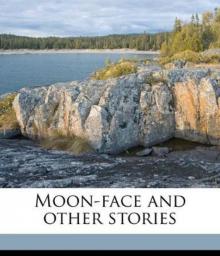 Moon-Face and Other Stories
Moon-Face and Other Stories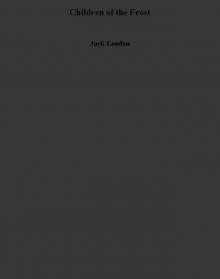 Children of the Frost
Children of the Frost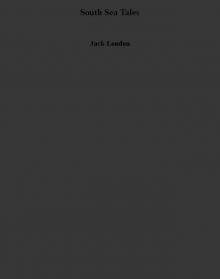 South Sea Tales
South Sea Tales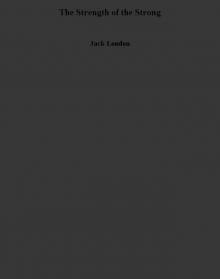 The Strength of the Strong
The Strength of the Strong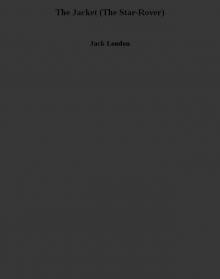 The Jacket (The Star-Rover)
The Jacket (The Star-Rover)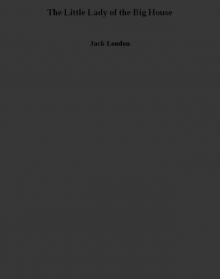 The Little Lady of the Big House
The Little Lady of the Big House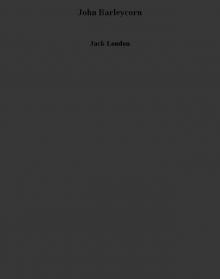 John Barleycorn
John Barleycorn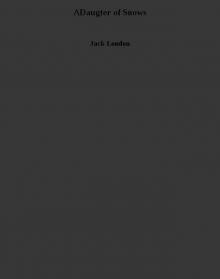 ADaugter of Snows
ADaugter of Snows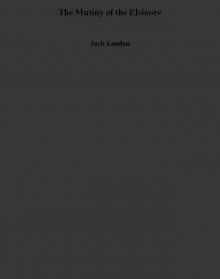 The Mutiny of the Elsinore
The Mutiny of the Elsinore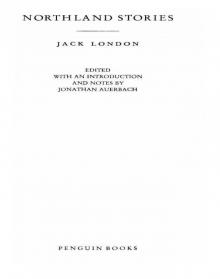 Northland Stories
Northland Stories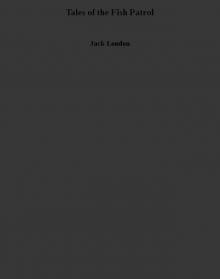 Tales of the Fish Patrol
Tales of the Fish Patrol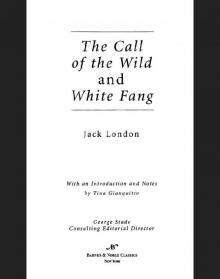 Call of the Wild and White Fang (Barnes & Noble Classics Series)
Call of the Wild and White Fang (Barnes & Noble Classics Series)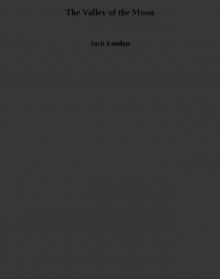 The Valley of the Moon
The Valley of the Moon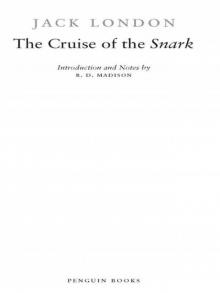 The Cruise of the Snark
The Cruise of the Snark The Game
The Game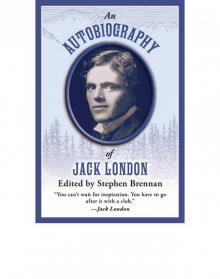 An Autobiography of Jack London
An Autobiography of Jack London